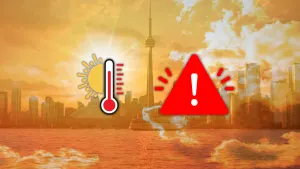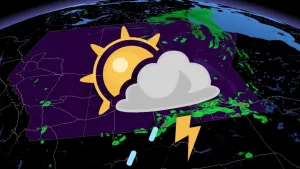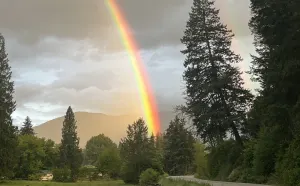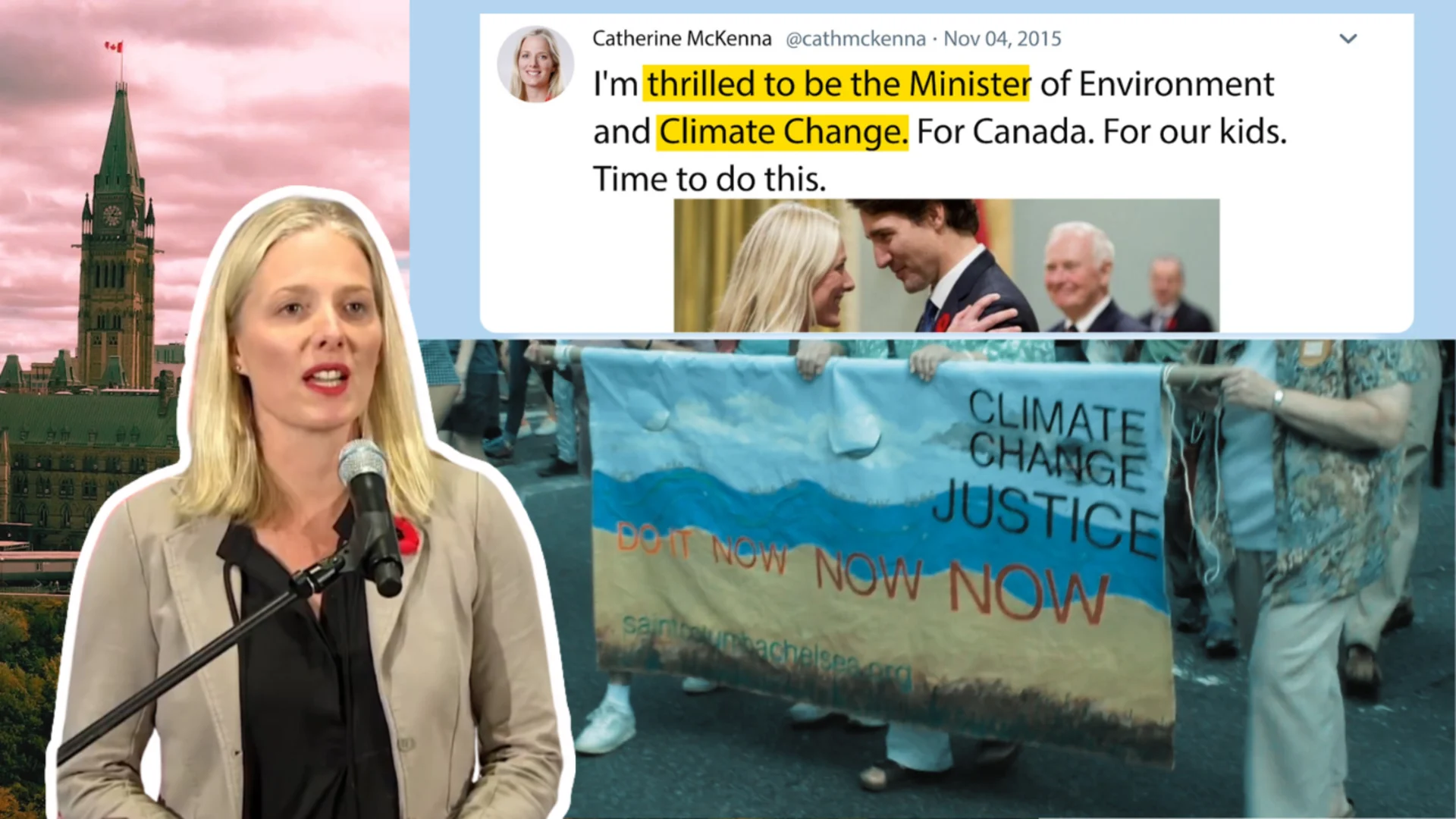
Canada's 'Climate Barbie': How Catherine McKenna moved from insult to owning it
In this fifth episode of our Climate Changemakers series, we talk to Catherine McKenna, a well-known name in Canadian federal politics, to learn about the global environmental work she is currently tackling and see how she rose above harassment to reach great heights.
Long before the Barbie movie swept silver screens across the globe, Catherine McKenna was far removed from the world of pink plastic.
Nowadays, calling someone “Barbie” could be seen as a sign of empowerment, but in the 2010s, “Climate Barbie” was a sexist teardown intended to diminish the accomplishments of a formidable public servant.
In 2017, controversy struck when Conservative MP Gerry Ritz tweeted a link to a climate-related news story with the comment, ‘Has anyone told our Climate Barbie!’ (referring to McKenna).
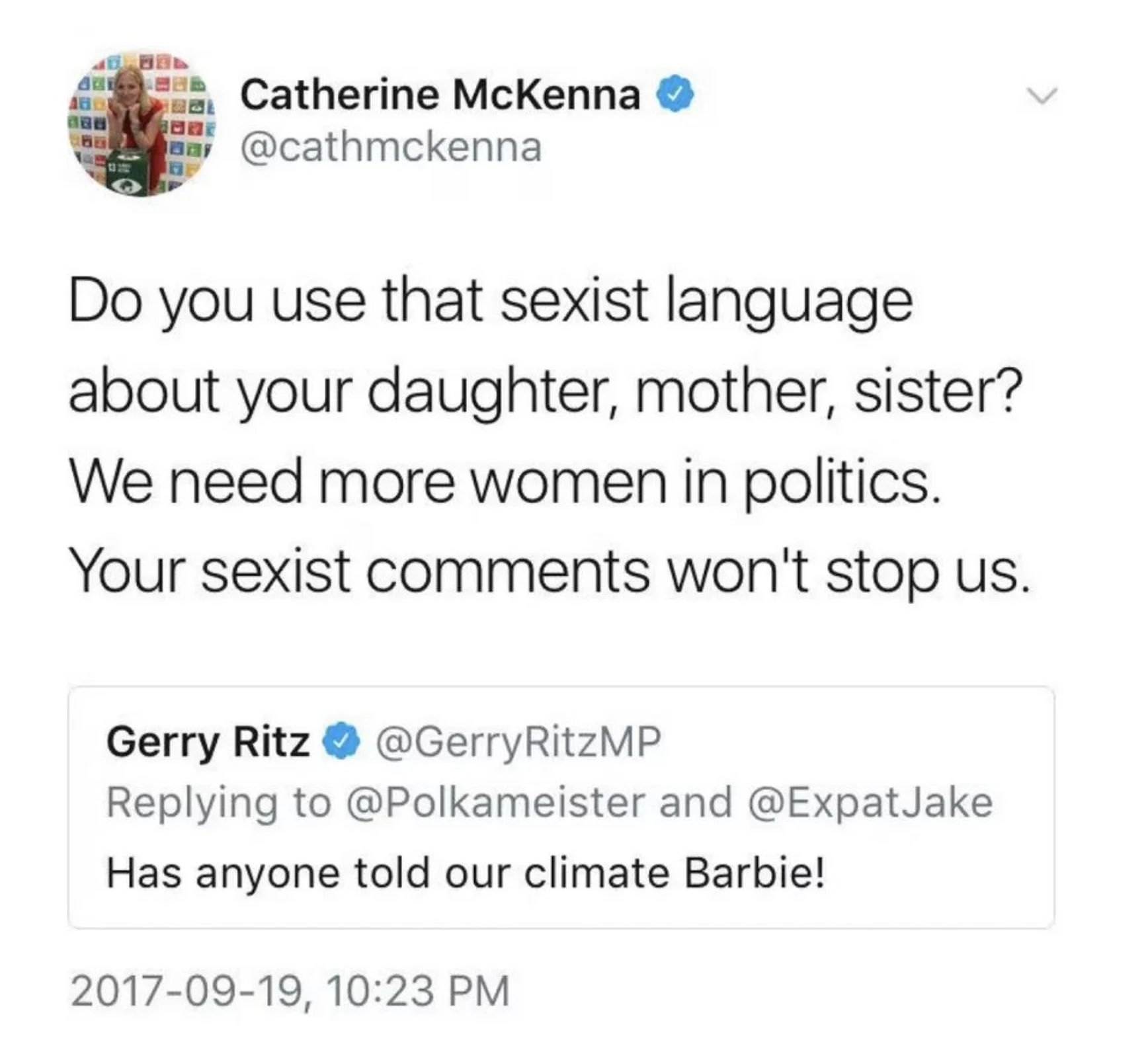
“Then I was like, OK, it's done. I'm not holding back now. Because it's not cool,” McKenna recalls with complete determination. “It's one thing to have random people on the internet, it's another to have a person in the House of Commons who's elected to be saying these things and giving it a lot of oxygen. So my team didn't want me to do it. But I was like, ‘sorry, I'm just doing it.’ I can't remember the exact [post]. But, I was like, ‘Is this the kind of language you would use with your mother, sister, girlfriend?’ Don't use it on me. Don't try to diminish me and all those women who are working on climate change, because it's not going to work.”
Catherine McKenna is a well-known name in Canadian federal politics, not only because she introduced a national climate plan and a Canadian carbon tax during her tenure as the first official climate and environment minister in the country, but also because she did so while being pelted with disparaging insults meant to discredit her.
In this fifth episode of Changemakers, we talk to McKenna, learn about the global environmental work she is currently tackling, and see how she rose above the harassment to reach great heights.
And we hear what it was like to persevere through a time when it wasn’t easy being labelled a Barbie.
It All Started With a Coup
“I did not play with Barbies,” she says in an interview with The Weather Network. “I mean, that's kind of ironic, because later on I was like, ‘oh, God, why are they calling me Barbie?’ It was even more irritating because my mom did not like Barbies. She didn’t get them for me. I didn’t care because I wanted to do things like go play in the creek and build forts.”
McKenna speaks with us from her home library, an impressive room filled with books and pictures of her kids, alongside images of her meeting the likes of Barack Obama and Pope Francis. And then, tucked away in the corner, is a Barbie. She says she kept it as a reminder of the adversity she faced, and ultimately overcame.
Growing up in Hamilton, Ont., McKenna spent her early years as a passionate, competitive swimmer—an outlet that taught her the importance of strength and perseverance at an early age.
In the 90s, during her university years, she spent time travelling and working abroad, falling in love with Indonesia. She was dating a Canadian diplomat who was stationed in the country. What she didn’t know was that a massive coup was about to take place and that she would get caught right in the middle of it.
A series of youth-led protests resulted in thousands being killed and the country’s longtime dictator being overthrown. The 1998 tragedy in Indonesia followed incidents of mass violence and anti-government demonstrations. The frustrated majority were fighting against corruption. McKenna studied law back in Canada, but now she was witnessing democracy in action.
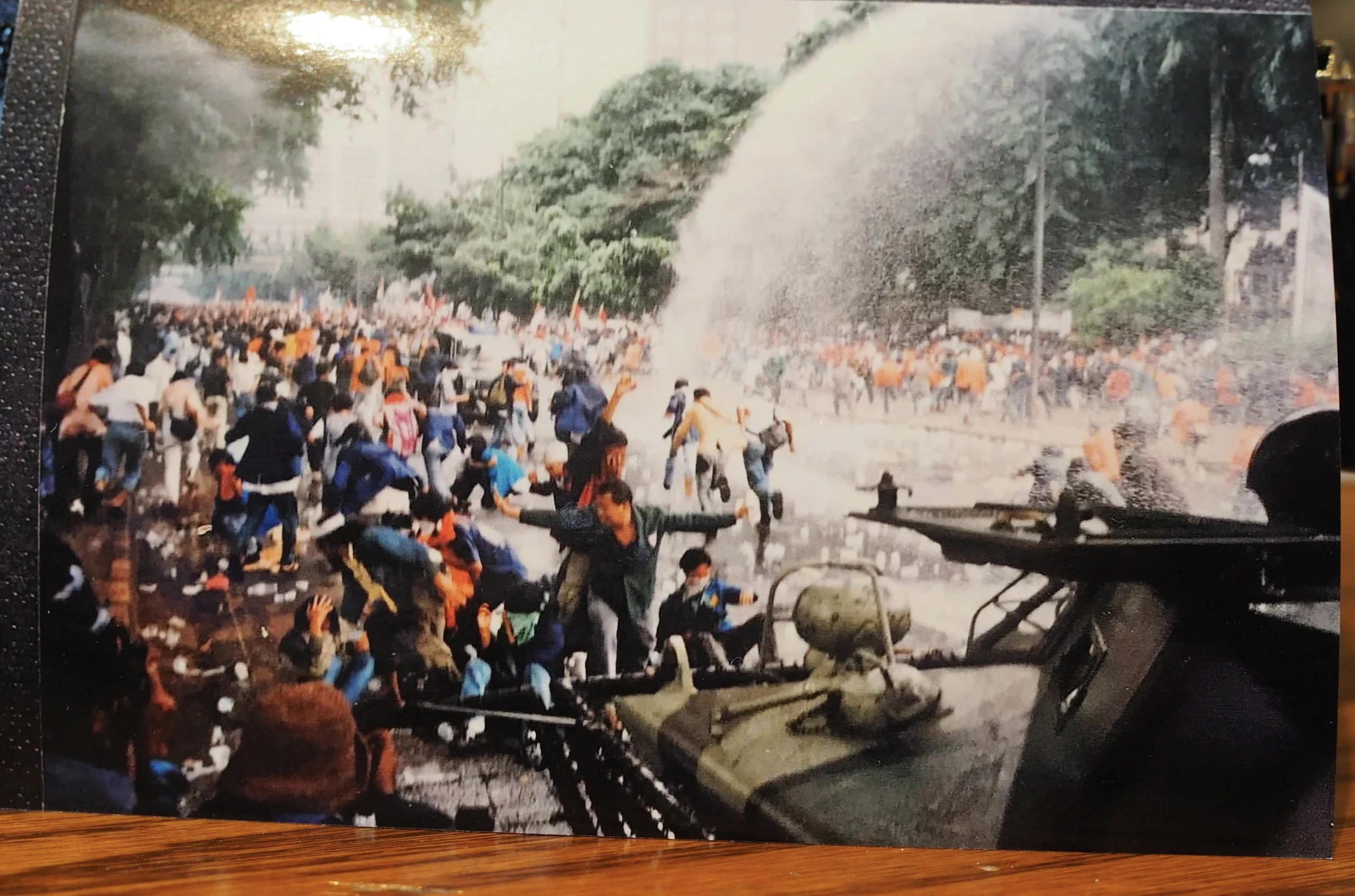
McKenna was witness to the 1998 protests in Indonesia, which were triggered by corruption, economic problems, including food shortages and mass unemployment. (Submitted)
McKenna is thoughtful and slows her speech to really punch out the next few things she says, recalling the moments she had to run along with a group of students in a violent protest.
“I realized that they had shot a lot of young people. It was one of those horrifying incidents because I realized democracy is way more than what we think about it. These people, they died, they fought with their lives. They called it ‘Black Friday.’ And I just realized, OK, this is real, this is real. This is what people will do. They will lay down their lives. That had a real impact on me. I ended up later starting a charitable organization with a good friend called Canadian Lawyers Abroad.”
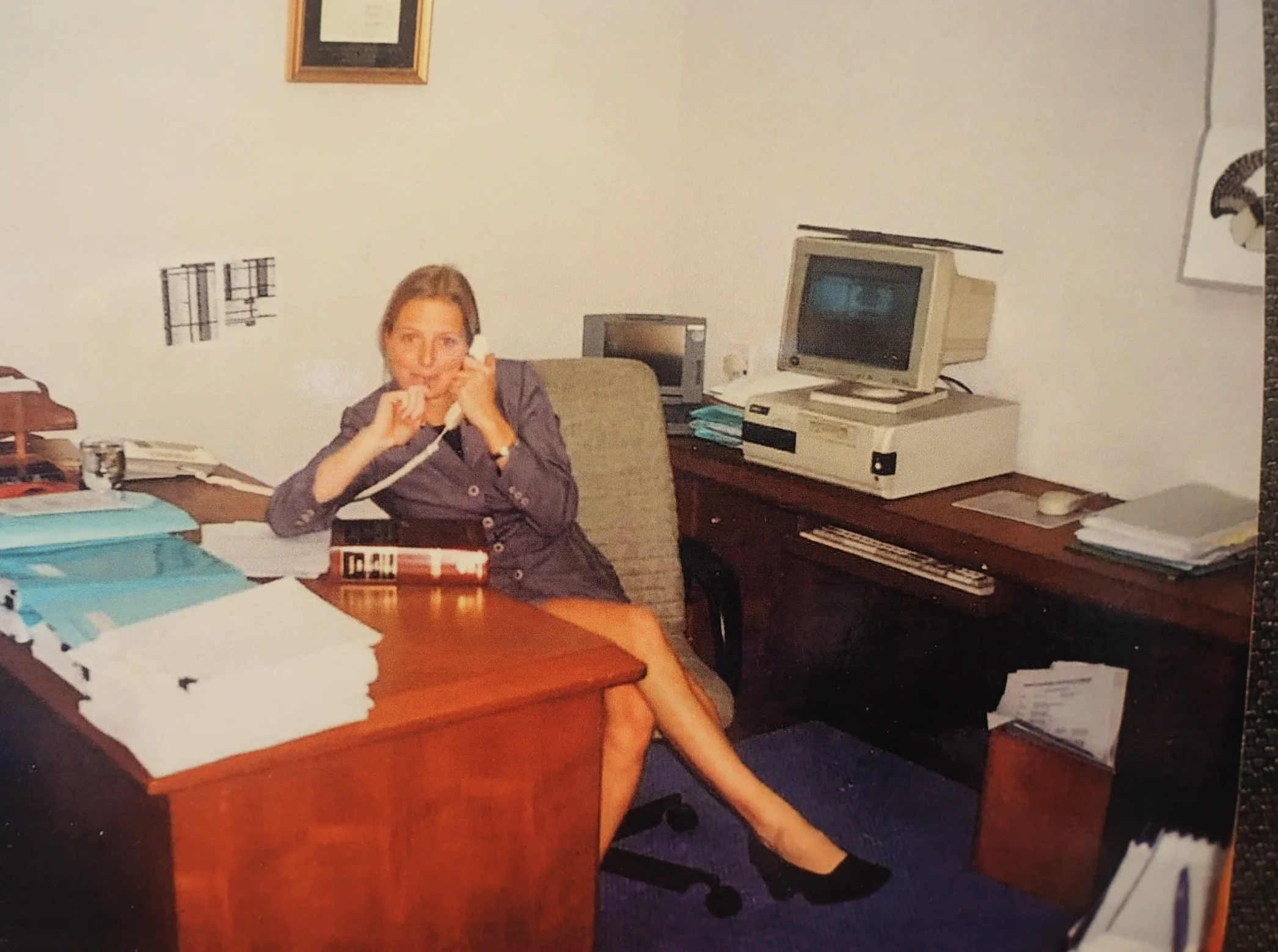
After the 1998 Indonesia tragedy, McKenna was inspired to work as a negotiator for the United Nations mission in neighbouring East Timor. (Submitted)
She stayed in the area and even worked as a negotiator for the United Nations (UN) mission in neighbouring East Timor. These events lit her humanitarian and democratic fire, laying the groundwork for McKenna’s decision to enter politics in Canada.
Entering Politics: “Just watch me”
“Also at that time, I was really tired of the [Stephen] Harper government,” Mckenna says.
“I mean, it sounds political, but I was a politician; I became a politician. I was running a human rights organization that I'd started [Canadian Lawyers Abroad], and I just realized everything we were doing, whether it was with Indigenous youth, whether it was internationally on human rights and the rule of law, those things really seemed under threat. I felt like I was banging my head against the wall, trying to do these important things. But there was a real limit if we didn't get a change in government, and that's when I realized that politics really matters.”
She had a busy family, with three young children and a successful legal career to also contend with.
“When I decided to run, some people thought it was bonkers because I had three kids. In life, a lot of times when you are a woman, people will say you can't do it. I remember when I announced I was going to run in politics in Ottawa Centre, people were like, ‘what are you talking about? You'll never win.’ I was like, OK, just watch me,” McKenna recalled.
She did indeed win on that first riding in Ottawa Centre. A campaign that her team credits with knocking on 100,000 doors to solicit support. After being sworn in in 2015, her hard work earned her a cabinet portfolio. McKenna became Canada’s first official minister of environment and climate change.
But in 2015, climate change activism was new to the majority of the public, and it wasn’t talked about like it is today. Some people considered her position a waste of money, and her eco-views weren’t popular with a vocal minority, so, in true anti-feminist nature, her political opposition chose to belittle her by targeting her appearance.
'Climate Barbie,' the Harassing Slur
And then came the Barbies.
Hundreds —if not thousands of them. They came in the mail, and they showed up in social media posts alongside McKenna’s image. Mauled dolls turned up at her home in an attempt to intimidate her.
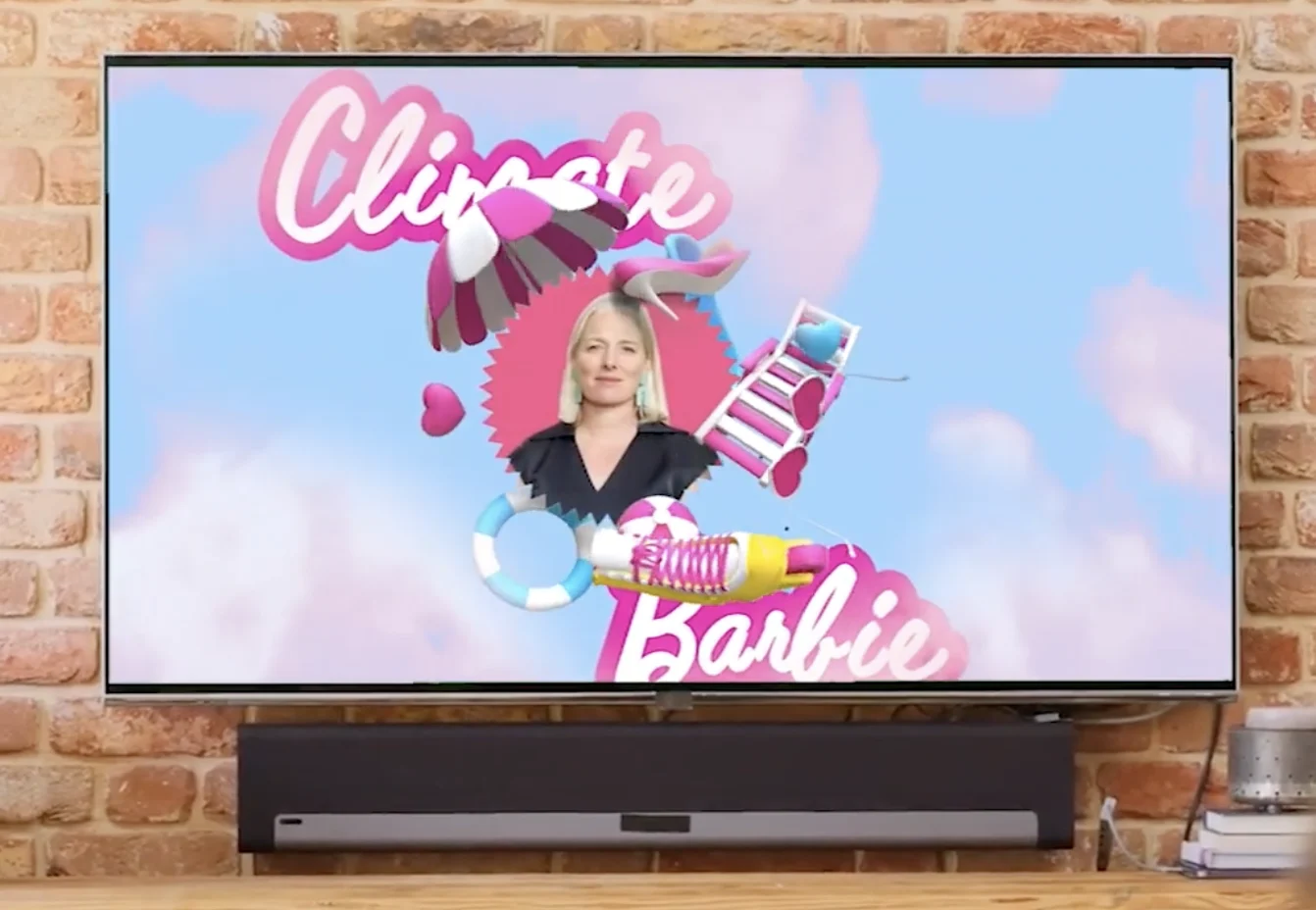
(Graphic: The Weather Network)
Like it or not, Canada’s freshly appointed climate and environmental minister had become synonymous with the iconic children’s toy.
“It all happened quite quickly, and then suddenly, I was ‘Climate Barbie.’ I was like, ‘Why are they calling me Climate Barbie? Why are they sending me these Barbies? Why are there images on social media hitting me over the head and crunching me as a Barbie?'... I'm just trying to tackle climate change, one of the biggest problems, or, [in] my view, the biggest problem we face. [It is] also a huge opportunity for cleaner air, cleaner water, good jobs, and a sustainable future for our kids. It was annoying. I was like, 'OK, I'm just not going to react.' So I didn't really do anything for a long time, even though I was irritated,” says McKenna.
But the sexist Barbie pushback continued, especially from right-wing conservative reporters. In a curt and public exchange that was broadcast live during a press conference, McKenna demanded a reporter’s media outlet stop calling her “Climate Barbie.”
“I said, OK, before I answer that question, are you going to say that you are going to commit to never calling me Climate Barbie again? And it was just like dead silence, and I kind of looked at the other ministers. I was like,'sorry, but it had to be said.’ I knew I had to be very, very calm. I could not be emotional. I had to be super-rational, because if I wasn't, then I would get attacked for being hysterical, shrill, or God knows what. And so it took everything I could muster to just be very calm,” McKenna said.
Trying to turn the negative insults around, at one point she even proposed the idea to a high-up employee at toy manufacturer Mattel to create a “Climate Action Barbie,” even with all the bad that had come with the name.
“I was having a conversation with someone very senior there a while ago. I was like, ‘you should really get a Climate Action Barbie, she'll be on a bicycle, she'll be wearing like, you know, a save the world T-shirt, she'll have a basket and a water bottle. And I said, but it had to be 100% sustainable, like it had to be recyclable.”
From Online to Offline
Unfortunately, the climate doll didn’t materialize, and the name “Climate Barbie” continued. To make matters worse, the barrage of insults moved from online to offline. She was verbally attacked with profanities while out in public with her family, even requiring security with hecklers showing up to her home. She even had to deal with a misogynistic slur spray painting and defacing the front windows of her campaign office.
“I did not like that it became way more than me. It was suddenly putting my family at risk. In the end, I put up a big stake and I said, 'this is not OK.' It took a while, but eventually, there were protection measures put into place. I think we have to be way more serious about this because women have been killed,” said Mckenna.
As hate came in, McKenna used it to fuel her fire to create positive change. She led the signing of the Paris Agreement, a worldwide commitment to limit the irrevocable consequences of climate change. She put a price on pollution, bringing forth a Canadian carbon tax policy, launched an endeavour with the UN for women leading in climate change, and made historic investments in public transit and green infrastructure.

“The funny thing is, I feel like I was like, 'I'm not giving anyone the satisfaction of me giving up'. I'm just not; it's not my personality, the person I was, I'm like doubling down, which may be too much, but I was like, forget it. This is so important. That's the basis of the Paris Agreement: that everyone has committed to a temperature goal of 1.5 [degrees]. And everyone is committed to doing their part themselves, too. And it did set the stage.”
Leaving To Fight On Her Own Terms
Now, Catherine Mckenna’s strength and perseverance is still her guiding light as she tackles even larger climate issues, not just for Canada, but for the world. In 2021, Mckenna decided to leave politics to fight on her own terms. She started Climate and Nature Solutions, an advisory firm that works with governments, big businesses, and universities across the globe to criticize and create short and long term truly net-zero climate solutions.
Sitting up straighter, Mckenna said, “I didn't leave politics because of the hate. In fact, it made me stay longer. Because I was like, ‘I'm gonna fight it.’ And eventually I was just like, ‘I kind of want to fight climate change globally, there's so much to be done’. So, that's why I decided to leave. Also, for my kids, post-pandemic, I want to spend more time kind of rehabilitating our family.”
Since leaving politics, Mckenna has been given high-profile global tasks.
In March 2022, UN Secretary-General António Guterres appointed her to chair a group of experts to help businesses, investors and cities and regions to level-up net-zero commitments. The 18-member group brought experts from a wide array of sectors including businesses, banks, think-tanks and academia. They were tasked with a report developing stronger and clearer standards, and criteria for assessing commitments to reach net-zero.

In March 2022, UN Secretary-General António Guterres appointed Catherine McKenna to chair a group of experts to help businesses, investors and cities and regions to level-up net-zero commitments.
Mckenna added, “2030 is a key date. We need to reduce emissions globally by half around the corner. And we don't have a lot of time. That means people actually have to do the work now. And it's not that complicated, in a way, as I say to folks it's measurable. Emissions need to go down and money needs to go to clean at scale, from dirty fossil fuels to clean. And that needs to happen in line with the science.”
Reclaiming the Name?
That label she once hated, Climate Barbie? She’s seeing the sentiment starting to mirror the positive and empowering character traits now associated with the doll. With the success of the recent movie and the change of heart of Barbie as a women’s empowerment icon, so, too, is a different ring to the name. Because as much as the environment needs to be fought for, so does the treatment of women worldwide.

“Heck, if it takes a Barbie movie to make some really important points about the impossible expectations on women to be beautiful, but also super successful, but also never be angry and always be very supportive, that's really important. It's gonna take a lot more than a movie, for it to change things, but at least it sparked a conversation.”








